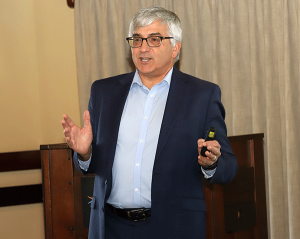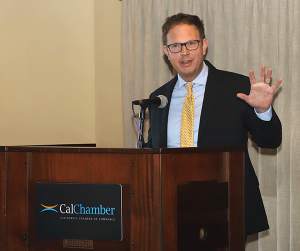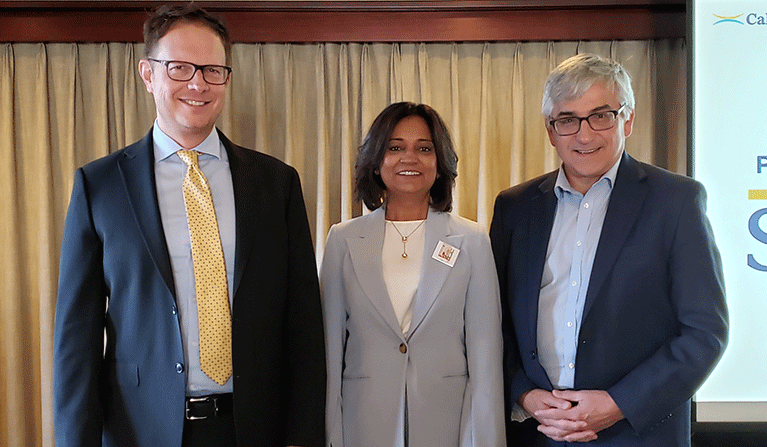Growth in digital trade represents a great opportunity for U.S. and California companies to expand ties with Latin America in general and Brazil in particular, according to speakers at a recent international breakfast meeting of the California Chamber of Commerce Council for International Trade (CCIT).
The speakers at the CCIT gathering on March 8 were Richard Kiy, president and CEO, and Shane Christensen, diplomatic fellow, both from the Institute of the Americas.
For 40 years, the Institute of the Americas — located on the University of California, San Diego campus in La Jolla — has promoted sound public policy and fostered cooperation between public and private sector stakeholders across the hemisphere.
Kiy commented that growth in digital trade doesn’t get as much attention as goods, yet services accounted for more than 33% of U.S. exports in 2020. Digital trade-related exports — information and communications technology (ICT) — made up close to 60% of the services exports, according to information compiled by the Harvard Growth Lab.
Digital Trade Leaders

Latin America leaders in digital trade services, Kiy pointed out, are Brazil, Argentina and Costa Rica.
ICT services exports in 2020 accounted for 23.7% of total Costa Rican exports ($6.8 billion), 7.14% of total exports from Argentina ($7.1 billion), and 6.5% of total Brazilian exports ($21.9 billion), he said.
By comparison, he commented, Mexico’s total exports of ICT services was only $0.78 billion in 2020, which represented 0.15% of total exports.
Kiy presented a color-coded slide showing that leading California ICT service companies have a presence in Latin America so they can develop digital products and solutions for local and regional markets, as well as export to international markets, including the United States.
Because of the gap between the number of U.S. college graduates with computer science skills and industry needs, companies are turning to other countries to fill those jobs. Workforce sources, he said, include India, Eastern Europe and Latin America.
‘Nearshoring’
One factor driving investment in Latin America, Kiy explained, is “nearshoring,” the desire of U.S. companies to move some manufacturing closer to home.
Mexico is the preferred nearshoring choice because of its proximity to the U.S. market, the U.S.-Mexico-Canada Agreement and established supply chains across North America.
Concerns about Mexico, including its underinvestment in energy infrastructure and water scarcity, are causing companies to consider other countries in Latin America, such as Brazil and Colombia, Kiy said.
Brazil

Christensen, who is the former U.S. Consul General for Porto Alegre with responsibilities for diplomatic relations with two southern Brazilian states (Rio Grande do Sul and Santa Catarina) from 2020 to 2023, described emerging opportunities in Brazil, the second largest democracy and second biggest economy in the hemisphere.
The value of total exports and imports between Brazil and China is greater than the exchange between Brazil and the United States. China’s imports from Brazil are concentrated in “core commodities,” such as soy, protein and agricultural products, that ultimately do little to help Brazil develop its economy, Christensen explained.
The United States, however, is the largest destination for Brazilian value-added goods and services, which are important drivers of economic growth and jobs, he said. Moreover, the United States is the biggest source of foreign direct investment in Brazil.
Brazil’s economic priorities, as outlined in the policies of President Luiz Inácio Lula da Silva, will generate new opportunities for California companies, which are national leaders in many areas Brazilian policy emphasizes, Christensen commented.
Among the six priority areas identified in President Lula’s industrial policy in January were the digital transformation of the economy, and the bioeconomy, including decarbonization and energy security.
California, Christensen said, can be an important partner with Brazil in areas such as technology, investment, capacity building, and an exchange of best practices and expertise.
Brazil has a thriving entrepreneurial ecosystem, including innovation hubs, such as São Paulo, Christensen commented. He also pointed out that:
- The country is a world leader in renewables — more than 80% of Brazil’s electricity grid is supplied by renewables. Brazil is looking for private sector engagement to propel its clean energy transition, not only in solar and wind, but also clean hydrogen and sustainable aviation fuel.
- Opportunities exist to cooperate with the United States to increase the supply of critical minerals in support of the energy transition; Brazil is a source for 17 of the U.S.-designated critical minerals.
- The United States and Brazil recently launched a clean hydrogen action committee as part of the U.S.-Brazil clean energy industry dialogue. There are efforts to expand bilateral cooperation in this area.
- The California Governor’s Office of Business and Economic Development (GO-Biz) has organized a hydrogen development effort and is bringing together market participants.
- E-mobility also provides opportunities for collaboration due to California and Brazil having a shared interest in reducing greenhouse gas emissions. Deployment of electric vehicles and battery technology is one area to explore.
Staff Contact: Susanne T. Stirling

Susanne T. Stirling








